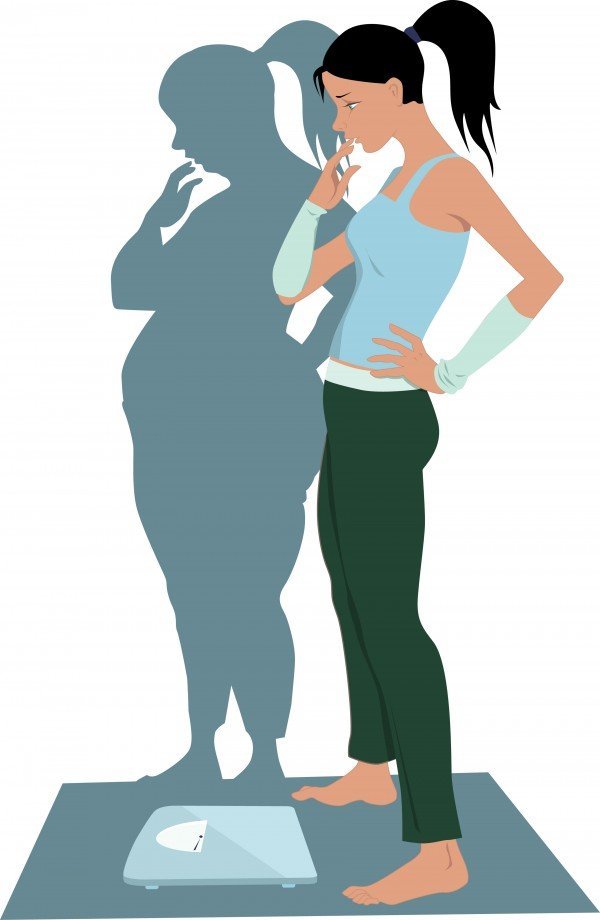I know.
This topic is a bit more serious than a lot of other things I share on this blog, but I feel very strongly that it needs to be discussed. If you feel like you might be struggling with an eating disorder, please don?t think I am here to shame you. Nope ? I have been there in my own life. For many years I struggled with a combination of eating disorders, and I know this is something I will forever need to keep in mind to help my recovery for the rest of my life.
So, if you are reading this, and you are struggling, please understand I simply don?t want you to hurt like I hurt. I?m here to help you identify if you might need help, or if someone you know does. I?m here to help save you from the painful battle that I endured.
Here are a couple of staggering statistics:
? Up to 24 million people (male and female) of all ages suffer from an eating disorder in the U.S.
? Only 1 in 10 people suffering from an eating disorder receive treatment.
That last statistic is pretty scary, especially since eating disorders can cause major health problems and even death. Maybe you?re one of the millions who needs help, or maybe you know someone who suffers from an eating disorder. Hopefully this discussion will give you some helpful tools in either case.
An eating disorder, to put it plainly, is an illness that stems from unhealthy behaviors associated with food and weight. These unhealthy habits could include overeating, starving, vomiting, and others.
Let?s face it. There?s tremendous pressure in today?s society to be magazine-cover thin. Even though we realize many of these photos are altered and airbrushed, we still see the thin person on the cover, who looks soooo happy, and we want to be that person. And some people are willing to do anything to become that person, including behaviors that lead to eating disorders.
Eating disorders are categorized into three types:
- Anorexia Nervosa: With this illness, a person has a fear of gaining weight and usually becomes dangerously thin. It mostly affects teen and young adult girls. Those who suffer from anorexia are very critical of themselves, obsess over food, exercise excessively, take diet pills, eat too little, and/or see themselves as fat.
- Bulimia Nervosa: This disease is characterized by bingeing, followed by purging (through vomiting and/or laxative abuse), and also affects mostly teen and young adult girls. Those suffering from this disorder are often a normal weight or slightly overweight, feel out of control, exercise excessively, are afraid of gaining weight, experience depression and anxiety, are more susceptible to substance abuse, and/or have a somewhat distorted body image.
- Binge-eating disorder: Unlike anorexia and bulimia, people suffering from this disorder don?t try to exercise or purge to compensate for the excessive amounts of food they eat. Their body weight ranges from normal to obese, and they often eat alone, feel out of control, and/or can experience feelings of guilt, shame, and depression. This disorder affects mostly middle-aged men and women, and can be triggered by stress, anxiety, and/or boredom. Most of the individuals we work with on Extreme Weight Loss struggle with this disorder.
The most common treatment for an eating disorder is therapy ? learning about yourself and how to find balance and control with food. However, other treatments can involve medication, and sometimes even hospitalization.
If you or someone you know is affected by an eating disorder, here are some important things to remember:
- Never compare yourself to others. We all have different bone structures, genes, and cultures. What is a healthy weight for one person is not necessarily a healthy weight for another. I?m quite petite, so a healthy weight for me is not a healthy weight for a person who?s much taller with a not-quite-so-petite bone structure. But I must admit, this was very difficult for me in my teen years, and even into early adulthood. PS ? this is one of the reasons I CrossFit and train for performance. The feeling of ?Skinny? doesn?t hold a candle to the feeling of ?Strong?. I?m hooked ?
- Don?t let the number on the scale define you. It?s just a number that?s affected by all the things listed above. Instead of working toward a certain number on the scale, make being healthy your main goal. I know. Sometimes that number we see on the scale can either make our day or send us into a mini-meltdown. As women, our weight can fluctuate by a few pounds?overnight?depending on what time of the month it is, and also on the types of foods we ate yesterday. Depend, instead, on how your clothes fit and how you truly feel. Once again, strength training and Crossfit helped me get over this number and focus on health.
- Find balance in your life between getting healthy and living life. Fixating too much on one thing is not healthy and in no way leads to a balanced and happy life. While Chris and I love to work out, we also know there are many other things in life that are just as, or more, important. We work together to make sure we create room in our jam-packed schedules for those things we feel passionate about. Let?s face it?you never find time. You must create a time for balance. Allowing ourselves to focus on these other more important things allows us to see fulfillment and happiness in areas outside of ourselves.
- Realize that falling is not failing. Failure happens when we don?t get back up and try again after we fall. Learn from your falls and you?ll become a much stronger person. If you?ve watched our show, you?ve seen our contestants experience this over and over again. How are we supposed to learn how to succeed if we never fall?! Anyone (including myself) that has been down (or is going down) the road to recovery from an eating disorder knows that it isn?t easy. We fall. We mess up. Sometimes we relapse. We are human. For anyone that doesn?t struggle during recovery?all I can say is you must be super-human ?. But remember that falling is okay. It doesn?t mean we fail. Like I said, we only fail when we choose not to get back up.
- Build a support system. Find those whose opinions matter to you and who love you for the person you are right now. They will bend over backwards to help you through this struggle?I promise! My biggest supporters were my late father and my mom (in addition to therapists). Find your supporters ? maybe a best friend, a co-worker, a sibling?
- Get help. There is nothing weak about getting help when you need it. In fact, asking for help is a definite sign of strength! This is such a hard step for most people. There are many organizations that specialize in helping those with eating disorders, and one we?ve featured on our show is Shades of Hope in Dallas, Texas. You can also go to the National Eating Disorders Association?s website for more helpful information.
While eating disorders are very serious illnesses, they can be overcome, and those who suffer from them can go on to lead normal, healthy, and happy lives. It?s all about finding and becoming the best?and healthiest?person you can be!
And please check out this other post on my blog for more information on my journey to overcome my own eating disorder.
*Source of basic information about eating disorders: mayoclinic.com


64 Responses
Hello Heidi,
My name is Tanya. I’m still in the process of actually taking control. Most of the time I don’t know what to do. I was better when I was seeing a therapist about half a year ago but that crashed and burned for a family reason. Now I’m back where I started and I can’t actually open up even more to anyone. The body image, yes, I had that all my life. I know it’s wrong but not feeling good about myself is how I feel all the time. Healthcare in Ireland is not great(that’s where I live) and I just feel like I’m all alone in this. Anxiety, yes, I feel it all the time, every single minute of the day. Maybe I should try meditation or Pilates, Yoga is not for me, I tried. And also it seems that right when I’m on the right path with fitness, stuff just gets thrown on top of me which interferes and then I don’t have time for what I enjoy and bad habits come back. It’s just a never ending circle.
Heidi,
Thank youfor this post and for opening up about your struggles with eating disorders and bulimia. As someone who has suffered from bulimia for 8 years and hated her body for even longer than that, it is honestly comforting to see that someone I look up to so much (and wish I could look like and be on a daily basis) has struggled with the same issues, though I hate that you
vedealt with that and that anyone deals with it. I would say I’m improving, but it’s a constant battle, especially when I hate everything I see when I look in the mirror. It’s also amazing to me that you were able to overcome these issues and have 4 beautiful children, as I can honestly (and I’m sure selfishly to most people) say that my number one fear of pregnancy is getting fat and not being able to handle it emotionally as I can barely handle eating sweet potato casserole or a cookie at Christmas. It’s something I’m trying to overcome, but it’s very hard as it is such a dificult topic to discuss with anyone. It is comforting to know I’m not alone and that it is beatable in a healthy way. Thank you again. You and Chris are such inspirations.